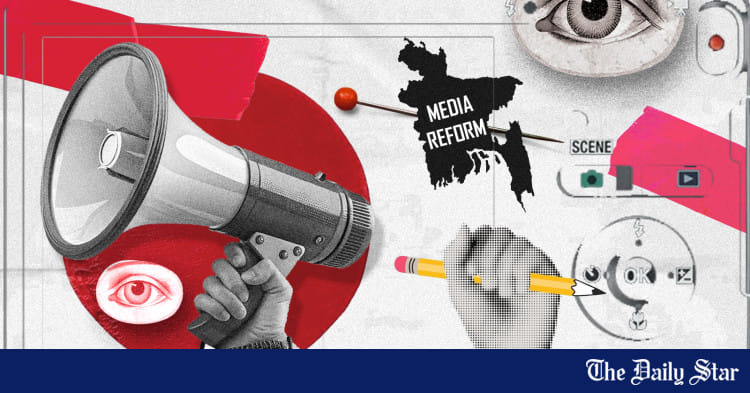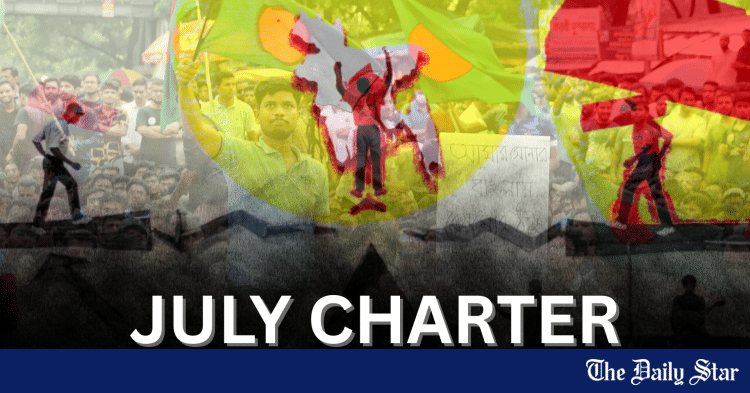Saif
Senior Member
- Joined
- Jan 24, 2024
- Messages
- 17,239
- Likes
- 8,332
- Nation

- Residence

- Axis Group


Media reform shouldn’t be left out of the July Charter
Ignoring media reform now would be a serious strategic misstep.
Media reform shouldn’t be left out of the July Charter

VISUAL: SALMAN SAKIB SHAHRYAR
As political negotiations intensify across party lines, the possibility of a national reform consensus—once unthinkable—now appears within reach.
Over the past weeks, Bangladesh has witnessed a marathon of political dialogues involving all openly active parties, ranging from allies to adversaries, aimed at reaching common ground on vital constitutional, electoral, and institutional reforms. These discussions, under the aegis of the National Consensus Commission created by the interim government, mark a significant departure from past political norms.
Until recently, talks were verging on a deadlock, particularly over key constitutional issues: limiting the prime minister's terms, creating a National Constitutional Council, and establishing a second chamber in Jatiya Sangsad. Encouragingly, parties have begun softening their stances, suggesting that consensus may be possible. Such agreement is essential for drafting what is being called the July Charter, a foundational document based on cross-party consensus.
However, the final shape of this charter remains unclear.
In a nationally televised address on June 6, Chief Adviser Prof Muhammad Yunus expressed hope that the charter would be finalised and presented within the month. Calling it "a pledge," Yunus explained that it would codify agreed reform proposals from the reform commissions. Political parties, by signing the document, would commit to implementing these reforms.
Yunus also pledged immediate government action on key reforms outlined in the charter. "We are committed to implementing the urgent reforms according to the July Charter," he said. "We also want to begin working on other parts. Hopefully, the remaining parts will be carried forward by the next elected government."
Following the mass uprising that toppled Sheikh Hasina's autocratic regime las year, the interim government launched 11 reform commissions—six initially, and five more later. However, the staggered timeline meant that only the first six commissions' proposals entered the consensus-building process.
These six commissions, focusing on the constitution, election, public administration, judiciary, police and anti-corruption, form the basis of current negotiations. The remaining five, covering media, labour, women's rights, health and local government, have been sidelined. The National Consensus Commission has not formally reviewed their findings, raising critical questions: are these areas considered less urgent? Or is consensus assumed, with implementation deferred?
The late submission of these second-phase reports (two to four months after the formation of the consensus commission) prevented their integration into the core discussions. This omission has had real consequences.
Take the Media Reform Commission, for example. It recommended limiting restrictions on the freedom of expression—especially those related to national security or foreign relations—to wartime only. This proposal was excluded from the Constitution Reform Commission's summary and thus not debated. It also suggested legal protections for journalistic integrity, including source confidentiality and privacy rights, modelled after Sweden and Switzerland. Despite support from at least one major party (BNP), these proposals have not entered the consensus framework.
Similarly, the media commission recommended a clear legal definition of contempt of court to ensure freedom of the press. This concern was raised with the Judicial Reform Commission, yet it is missing from the current judicial reform summary.
Another major gap involves reforming the colonial-era Official Secrets Act of 1923. While the Public Administration Reform Commission called for updating the law, it failed to specify how. The Media Reform Commission went further, proposing changes to Section 5 to both protect national security and legally safeguard investigative journalism. These recommendations, too, remain unaddressed.
Even the Constitution Reform Commission's 40-point list of fundamental rights and freedoms has been compressed into five general categories by the National Consensus Commission. If party leaders rely only on the summary instead of reviewing the full report, critical elements may be left out of the final draft.
Some issues, like granting autonomy to the state-run Bangladesh Television and Bangladesh Betar, have long enjoyed public support and are part of the historical reform agenda. Yet, despite repeated promises, implementation remains elusive.
Other proposals remain politically sensitive or require sustained commitment. For example, while the right to form trade unions is enshrined in the constitution, real progress on minimum wage laws, labour rights, and workplace safety remains slow. In a reformed political order, will workers have recourse—or even the voice—to demand justice?
At its heart, the July Charter aims to replace entrenched authoritarianism with accountable, democratic governance. But institutions such as parliament, the judiciary, public administration, law enforcement, and even the media have often served narrow interests. Without meaningful reform, they risk doing so again.
In the current market-driven environment, state-run media's autonomy is not enough. Private media must also be held to ethical standards. The Media Reform Commission warned about the corrosive effects of black money, media monopolisation, and editorial bias on democratic processes, particularly elections. The absence of media reform from these discussions is especially troubling, given its importance not only for democratic renewal but for ensuring free and fair elections. The Media Reform Commission provided detailed documentation on how media manipulation can impact electoral outcomes—something still fresh in many citizens' memories.
Ignoring media reform now would be a serious strategic misstep. At minimum, long-term reforms with urgent democratic implications must be accompanied by firm political commitments. So the central question persists: will the July Charter include them?
Kamal Ahmed is head of the Media Reform Commission in Bangladesh and an independent journalist.
VISUAL: SALMAN SAKIB SHAHRYAR
As political negotiations intensify across party lines, the possibility of a national reform consensus—once unthinkable—now appears within reach.
Over the past weeks, Bangladesh has witnessed a marathon of political dialogues involving all openly active parties, ranging from allies to adversaries, aimed at reaching common ground on vital constitutional, electoral, and institutional reforms. These discussions, under the aegis of the National Consensus Commission created by the interim government, mark a significant departure from past political norms.
Until recently, talks were verging on a deadlock, particularly over key constitutional issues: limiting the prime minister's terms, creating a National Constitutional Council, and establishing a second chamber in Jatiya Sangsad. Encouragingly, parties have begun softening their stances, suggesting that consensus may be possible. Such agreement is essential for drafting what is being called the July Charter, a foundational document based on cross-party consensus.
However, the final shape of this charter remains unclear.
In a nationally televised address on June 6, Chief Adviser Prof Muhammad Yunus expressed hope that the charter would be finalised and presented within the month. Calling it "a pledge," Yunus explained that it would codify agreed reform proposals from the reform commissions. Political parties, by signing the document, would commit to implementing these reforms.
Yunus also pledged immediate government action on key reforms outlined in the charter. "We are committed to implementing the urgent reforms according to the July Charter," he said. "We also want to begin working on other parts. Hopefully, the remaining parts will be carried forward by the next elected government."
Following the mass uprising that toppled Sheikh Hasina's autocratic regime las year, the interim government launched 11 reform commissions—six initially, and five more later. However, the staggered timeline meant that only the first six commissions' proposals entered the consensus-building process.
These six commissions, focusing on the constitution, election, public administration, judiciary, police and anti-corruption, form the basis of current negotiations. The remaining five, covering media, labour, women's rights, health and local government, have been sidelined. The National Consensus Commission has not formally reviewed their findings, raising critical questions: are these areas considered less urgent? Or is consensus assumed, with implementation deferred?
The late submission of these second-phase reports (two to four months after the formation of the consensus commission) prevented their integration into the core discussions. This omission has had real consequences.
Take the Media Reform Commission, for example. It recommended limiting restrictions on the freedom of expression—especially those related to national security or foreign relations—to wartime only. This proposal was excluded from the Constitution Reform Commission's summary and thus not debated. It also suggested legal protections for journalistic integrity, including source confidentiality and privacy rights, modelled after Sweden and Switzerland. Despite support from at least one major party (BNP), these proposals have not entered the consensus framework.
Similarly, the media commission recommended a clear legal definition of contempt of court to ensure freedom of the press. This concern was raised with the Judicial Reform Commission, yet it is missing from the current judicial reform summary.
Another major gap involves reforming the colonial-era Official Secrets Act of 1923. While the Public Administration Reform Commission called for updating the law, it failed to specify how. The Media Reform Commission went further, proposing changes to Section 5 to both protect national security and legally safeguard investigative journalism. These recommendations, too, remain unaddressed.
Even the Constitution Reform Commission's 40-point list of fundamental rights and freedoms has been compressed into five general categories by the National Consensus Commission. If party leaders rely only on the summary instead of reviewing the full report, critical elements may be left out of the final draft.
Some issues, like granting autonomy to the state-run Bangladesh Television and Bangladesh Betar, have long enjoyed public support and are part of the historical reform agenda. Yet, despite repeated promises, implementation remains elusive.
Other proposals remain politically sensitive or require sustained commitment. For example, while the right to form trade unions is enshrined in the constitution, real progress on minimum wage laws, labour rights, and workplace safety remains slow. In a reformed political order, will workers have recourse—or even the voice—to demand justice?
At its heart, the July Charter aims to replace entrenched authoritarianism with accountable, democratic governance. But institutions such as parliament, the judiciary, public administration, law enforcement, and even the media have often served narrow interests. Without meaningful reform, they risk doing so again.
In the current market-driven environment, state-run media's autonomy is not enough. Private media must also be held to ethical standards. The Media Reform Commission warned about the corrosive effects of black money, media monopolisation, and editorial bias on democratic processes, particularly elections. The absence of media reform from these discussions is especially troubling, given its importance not only for democratic renewal but for ensuring free and fair elections. The Media Reform Commission provided detailed documentation on how media manipulation can impact electoral outcomes—something still fresh in many citizens' memories.
Ignoring media reform now would be a serious strategic misstep. At minimum, long-term reforms with urgent democratic implications must be accompanied by firm political commitments. So the central question persists: will the July Charter include them?
Kamal Ahmed is head of the Media Reform Commission in Bangladesh and an independent journalist.








































